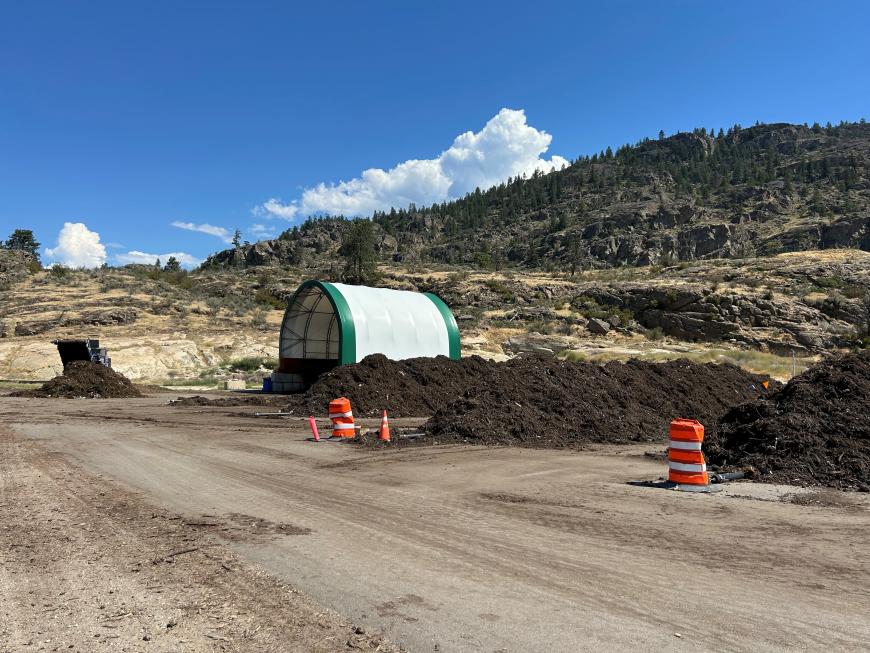Oliver Landfill
Summer Hours (March to November):Open Monday to Saturday: 10:00 am - 3:45 pm Closed all statutory holidays. |
Winter Hours (December, January, February):Open Monday to Friday: 12:00 pm - 3:45 pm Open Saturdays: 10:00 am - 3:45 pm Closed all statutory holidays and Boxing Day. |
|
Oil & Antifreeze are only received Tuesdays, Thursdays and Saturdays from 12:00 - 3:45 pm. Maximum 25 liters per day and proper containers required |
|
Phone: 250-490-4129 (Solid Waste Hotline) |
|
Email: solidwaste@rdos.bc.ca |
|
Fax: 250-499-5021 |
|
Address: 498 Saddle Ridge Rd, Oliver BC |
|
Visa, Mastercard, Debit Cards and Cash accepted. |
|
Tipping Fees and Charges 2025 (costs by material) Landfill Fees and Charges Regulatory Bylaw 2023 (Rules and Definitions) |
Before you go
- Remember to tarp or secure all loads or fees will be doubled to a minimum of $10.00.
- You can save a lot of money if your loads contain only seperated materials. Cleck in Fees and Charges above for items that can be recycled and what items are not allowed in the landfill.
- Asbestos, Demolition, Burned Structures, Lead Paint, New Construction
- Information on Depot Recycling: Recyclables must be sorted, as directed by signage.
- Agricultural Waste
Restrictions
- Paint is limited to 25 litres per customer per day.
- Fluorescent tubes are limited to 10 tubes per customer per day.
- Smoke alarms and CO2 detectors accepted.
- Mercury containing electronic and mechanical thermostats are accepted.
Recycling
Save money and reduce the amount of garbage you generate by separating recyclable materials from refuse.
See the following links for recycling information:
- information on where you can recycle items such as paint, batteries and used motor oil, refer to the "Where Can I Recycle" section of the website.
Prohibited (Hazardous) & Controlled Waste
Some types of waste are approved for disposal at the landfill but require special handling and disposal techniques to avoid creating health hazards, nuisances, or environmental pollution. Some waste, including radioactive, biomedical, automobiles, slaughterhouse, and other waste is prohibited from disposal at the landfill.
Contact the RDOS at 250-490-4129, toll free 1 8770610-3737 or email solidwaste@rdosbc.ca to find out ways to dispose of this waste.
View the most recent Landfill Design, Operations and Closure Plan (DOCP) for Oliver Sanitary Landfill
Organic Composting Facility
The Organic Composting Facility at the Oliver Landfill accepts food scraps and yard waste through the Town of Oliver's curbside collection program. Currently, the facility does not accept drop-offs from the public, and finished compost is not yet available for sale.
How is the compost made?
- The composting process uses aerated static pile composting with some turning. Organic materials are placed in long piles (windrows) over a system of perforated HDPE pipes. These are connected to a blower that introduces oxygen into the piles. The system is monitored using temperature probes and a web-enabled control platform, allowing staff to track and adjust conditions remotely. The piles are maintained at 55°C or higher for the first three days, and between 40–60°C for at least two weeks, to ensure effective pathogen reduction.
- Before composting begins, material is collected and pre-processed in a covered receiving area. Here, it is mixed and saturated with leachate, then shredded to reduce particle size and improve decomposition. After the aerated composting stage, the piles are moved to a curing area where they mature for 4–8 weeks. Once curing is complete, the compost is screened to remove any large or non-organic material.
Why aren’t compostable or biodegradable plastic bags accepted?
- These products often require very specific conditions to break down properly—conditions that are not met at this facility. If used, they can contaminate the final compost with microplastics and chemical residues. Plant-based or “bioplastic” liners are also not accepted for the same reasons. Instead, residents are encouraged to use food-soiled paper or cardboard as a compost bin liner. Clean cardboard should still go in your recycling.
The Oliver Organic Composting Facility was made possible through funding from the Organics Infrastructure Program (OIP), supported by the federal Low Carbon Economy Leadership Fund, the Province of British Columbia, and program recipients. The RDOS was one of 17 successful applicants.

Annual Report
Annual reports are created every year for all RDOS-operated landfills. These are to provide historic trend information, outline operations, track expenditures, and create recommendations.


